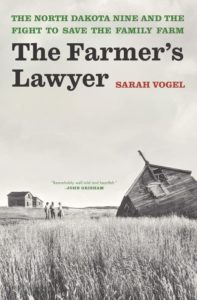Review of “The Farmer’s Lawyer” By Sarah Vogel
 The farm crisis of the 1980s gouged deep, long-lasting scars into rural communities and small towns across the U.S., including among PFI’s members – nearly a quarter of Iowa farmers were pushed out of farming in the decade between 1980 and 1990. Today, we understand the immensity of that crisis. But 40 years ago, that profound shift in farm ownership and economics was a quiet calamity that unfolded mostly untold.
The farm crisis of the 1980s gouged deep, long-lasting scars into rural communities and small towns across the U.S., including among PFI’s members – nearly a quarter of Iowa farmers were pushed out of farming in the decade between 1980 and 1990. Today, we understand the immensity of that crisis. But 40 years ago, that profound shift in farm ownership and economics was a quiet calamity that unfolded mostly untold.
In “The Farmer’s Lawyer” – part true-crime drama, part memoir, part history – Sarah Vogel gives us a front-row seat to an inspiring tale of how a few determined advocates helped turn the tide for hundreds of thousands of farmers in that hard time.
Often sharing the view from her aging car, readers join Sarah as she bumps along the back roads of North Dakota to farms, meetings and cafes with her papers, files and toddler son in tow. With her marriage over, credit cards maxed out and struggles paying her bills, she lives the pain of the farmers she is working for.
As an author, Sarah knows how to turn a behind-the-scenes account of a court case about banking regulations into a lively, warm-hearted, hard-knock page-turner. Woven around a central narrative about the twists and turns of a history-making class-action lawsuit on behalf of farmers facing foreclosure, the story is an epic hero’s tale: Sarah, a young lawyer and single mom from North Dakota who quietly files a daring, high-stakes suit against the U.S. government; the Farmers Home Administration (predecessor to the Farm Service Agency) and their lawyers; the U.S. Department of Justice; and a determined group of farmers, farm advocates and lawyers facing down epic injustice.
Intensely aware of what was at stake, Sarah and her colleagues sought to assemble a truly representative group of plaintiffs from North Dakota, where the case would be heard. Eventually, she found eight farm families willing to risk going public as plaintiffs. Still, it wasn’t until she searched out and secured a ninth family to represent Native American farmers that she felt the case was ready. Their strategy was to build an impeccable case in Coleman v. Block that would extend protection to 8,400 other farms then in foreclosure, and eventually to over 240,000 farms nationwide.
Sarah lets her readers know right away what a long shot she is. A self-described “research attorney,” she knows the regulatory world in-depth but has never tried a case, or even attended a full trial. When the opposing attorney pulls a surprise move requiring her to call witnesses the day before the case is to be filed, it’s just one more in a roller coaster of seemingly insurmountable hurdles. PFI members will recognize some familiar names – longtime advocates who were doing groundbreaking work on behalf of farmers, then and now. Each thread adds drama, emotion and urgency as the story reaches the powerful redemption of the judge’s ruling.
Sarah went on to serve two terms as the North Dakota Commissioner of Agriculture from 1989-1997, the first woman in the U.S. to be elected to such a position. In 1999, she won another significant case against USDA, Keepseagle vs. Vilsack, (and a related case in 2003), which addressed long-standing discrimination against Native American farmers and ranchers, and she remains an active advocate for family farms and Native rights.
Reflecting on the era’s lessons, Sarah closes by saying “the shift to bigger and bigger farms and corporatized farming is not inevitable … if we act soon.” Her story makes me proud of our Midwestern heritage of farm advocacy, and bolsters my faith that democratic institutions can be held accountable. If you enjoy a good legal thriller, a heartwarming tale of neighbors helping neighbors and an inspiring account of good people triumphing in the face of tremendous odds, this book is a great read. If you want to understand the impact of farm policy on real people, it is an essential read for our times.
Susan Futrell is a fifth-generation Iowan, author and apple enthusiast with four decades of experience in the sustainable food and farming world in marketing, distribution and education. She has been with nonprofit Red Tomato for the past 15 years and is also a freelance writer and consultant. She lives in Iowa City, Iowa.
